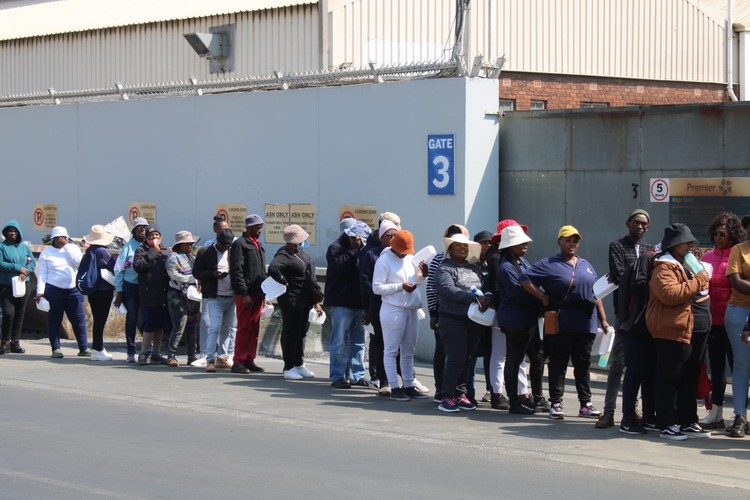Premier loses court bid to end Mister Sweet strike
Strike continues after Labour Court ruling
Striking Mister Sweet workers queued on Wednesday for food brought by supporters. Photo: Kimberly Mutandiro
The Johannesburg Labour Court has dismissed Premier Group’s urgent application to stop workers from striking at its Mister Sweet branch in Germiston.
Workers downed tools on 19 August, demanding higher wages.
In an application to the court against nearly 300 striking workers, Premier argued that the strike had turned violent and that other workers had been intimidated. The strikers, represented by one of the workers, Fikile Zwane, and three others, did not dispute that there had been violence but said they had not been involved.
Handing down judgment on 10 September, Labour Court Judge Reynaud Daniels said Premier had not shown that the workers had acted as a group.
He pointed out that the Constitutional Court had warned judges of the risk that where interdicts were granted too easily they might become “a great engine of oppression against workers and unions”, and that some employers might abuse interdicts to tilt the balance of power in their favour.
“Finally, of great importance, the Court warned that where interdicts are too readily granted this could undermine collective action, the right to engage in protected strike action, and debase and undermine the rule of law.” he said.
The judge said Premier had not presented a factual basis on which the court could find that the 294 workers had acted “as a cohesive group”, or that any or all of them had associated themselves with the intimidation and violence.
The workers are demanding a minimum wage of R12,500 a month for the lowest-paid workers and R16,500 for workers in higher-level positions.
“Our workers have been striking peacefully, and whatever acts of violence that may have taken place had nothing to do with us,” said Jaco Potlaki from the Simunye Workers’ Forum. “Premier should just agree to our terms and give the workers the higher wages that they rightfully deserve,” he said, adding that the strike would continue.
Asked for comment, Premier’s spokesperson referred GroundUp to a previous statement repeating its initial 7% wage offer.
Support independent journalism
Donate using Payfast

Don't miss out on the latest news
We respect your privacy, and promise we won't spam you.
Letters
Dear Editor
While there is not enough evidence in this GroundUp article to take sides definitively, one thing is clear: a labour court judge has referenced precedent from Constitutional Court cases to argue that interdicts should not be used to upset the balance of power, which is common in a collective bargaining process. However, the intimidation witnessed in this case clearly goes against the principles of collective bargaining, and unfortunately, an interdict becomes necessary to curtail such behaviour and force parties to the negotiating table.
Even if the Premier Group concedes to the demands, it follows as night follows day that a commercial decision will follow, leading to retrenchments and the loss of hundreds of jobs. This has been a pattern in South Africa over the last 30 years. Companies fold, downsize, and unemployment rises due to what many see as unreasonable demands by labour unions with a clear socialist agenda.
The motor industry is a prime example, where thousands of workers now sit at home, adding to our 42% unemployment rate. By failing to create an environment conducive to attracting entrepreneurs and foreign direct investment (FDI), the government is equally responsible for driving away businesses that, due to high labour costs, seek greener pastures in neighbouring and other countries.
How many items in your house are made in South Africa? Clearly, something is wrong.
© 2024 GroundUp. This article is licensed under a Creative Commons Attribution-NoDerivatives 4.0 International License.
You may republish this article, so long as you credit the authors and GroundUp, and do not change the text. Please include a link back to the original article.
We put an invisible pixel in the article so that we can count traffic to republishers. All analytics tools are solely on our servers. We do not give our logs to any third party. Logs are deleted after two weeks. We do not use any IP address identifying information except to count regional traffic. We are solely interested in counting hits, not tracking users. If you republish, please do not delete the invisible pixel.

